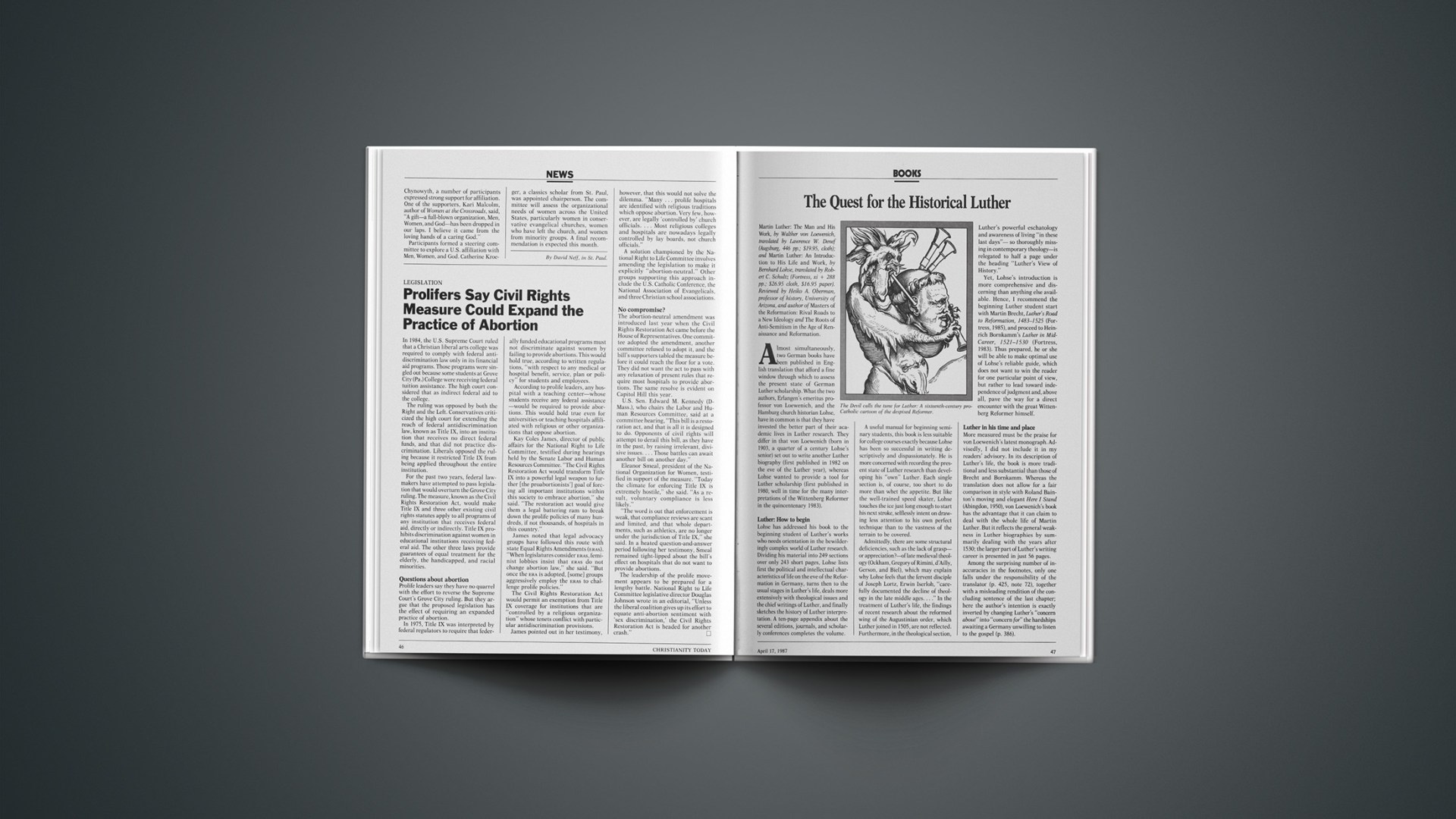In 1984, the U.S. Supreme Court ruled that a Christian liberal arts college was required to comply with federal antidiscrimination law only in its financial aid programs. Those programs were singled out because some students at Grove City (Pa.) College were receiving federal tuition assistance. The high court considered that as indirect federal aid to the college.
The ruling was opposed by both the Right and the Left. Conservatives criticized the high court for extending the reach of federal antidiscrimination law, known as Title IX, into an institution that receives no direct federal funds, and that did not practice discrimination. Liberals opposed the ruling because it restricted Title IX from being applied throughout the entire institution.
For the past two years, federal lawmakers have attempted to pass legislation that would overturn the Grove City ruling. The measure, known as the Civil Rights Restoration Act, would make Title IX and three other existing civil rights statutes apply to all programs of any institution that receives federal aid, directly or indirectly. Title IX prohibits discrimination against women in educational institutions receiving federal aid. The other three laws provide guarantees of equal treatment for the elderly, the handicapped, and racial minorities.
Questions About Abortion
Prolife leaders say they have no quarrel with the effort to reverse the Supreme Court’s Grove City ruling. But they argue that the proposed legislation has the effect of requiring an expanded practice of abortion.
In 1975, Title IX was interpreted by federal regulators to require that federally funded educational programs must not discriminate against women by failing to provide abortions. This would hold true, according to written regulations, “with respect to any medical or hospital benefit, service, plan or policy” for students and employees.
According to prolife leaders, any hospital with a teaching center—whose students receive any federal assistance—would be required to provide abortions. This would hold true even for universities or teaching hospitals affiliated with religious or other organizations that oppose abortion.
Kay Coles James, director of public affairs for the National Right to Life Committee, testified during hearings held by the Senate Labor and Human Resources Committee. “The Civil Rights Restoration Act would transform Title IX into a powerful legal weapon to further [the proabortionists’] goal of forcing all important institutions within this society to embrace abortion,” she said. “The restoration act would give them a legal battering ram to break down the prolife policies of many hundreds, if not thousands, of hospitals in this country.”
James noted that legal advocacy groups have followed this route with state Equal Rights Amendments (ERAS). “When legislatures consider ERAS, feminist lobbies insist that ERAS do not change abortion law,” she said. “But once the ERA is adopted, [some] groups aggressively employ the ERAS to challenge prolife policies.”
The Civil Rights Restoration Act would permit an exemption from Title IX coverage for institutions that are “controlled by a religious organization” whose tenets conflict with particular antidiscrimination provisions.
James pointed out in her testimony, however, that this would not solve the dilemma. “Many … prolife hospitals are identified with religious traditions which oppose abortion. Very few, however, are legally ‘controlled by’ church officials.… Most religious colleges and hospitals are nowadays legally controlled by lay boards, not church officials.”
A solution championed by the National Right to Life Committee involves amending the legislation to make it explicitly “abortion-neutral.” Other groups supporting this approach include the U.S. Catholic Conference, the National Association of Evangelicals, and three Christian school associations.
No Compromise?
The abortion-neutral amendment was introduced last year when the Civil Rights Restoration Act came before the House of Representatives. One committee adopted the amendment, another committee refused to adopt it, and the bill’s supporters tabled the measure before it could reach the floor for a vote. They did not want the act to pass with any relaxation of present rules that require most hospitals to provide abortions. The same resolve is evident on Capitol Hill this year.
U.S. Sen. Edward M. Kennedy (D-Mass.), who chairs the Labor and Human Resources Committee, said at a committee hearing, “This bill is a restoration act, and that is all it is designed to do. Opponents of civil rights will attempt to derail this bill, as they have in the past, by raising irrelevant, divisive issues.… Those battles can await another bill on another day.”
Eleanor Smeal, president of the National Organization for Women, testified in support of the measure. “Today the climate for enforcing Title IX is extremely hostile,” she said. “As a result, voluntary compliance is less likely.”
“The word is out that enforcement is weak, that compliance reviews are scant and limited, and that whole departments, such as athletics, are no longer under the jurisdiction of Title IX,” she said. In a heated question-and-answer period following her testimony, Smeal remained tight-lipped about the bill’s effect on hospitals that do not want to provide abortions.
The leadership of the prolife movement appears to be prepared for a lengthy battle. National Right to Life Committee legislative director Douglas Johnson wrote in an editorial, “Unless the liberal coalition gives up its effort to equate anti-abortion sentiment with ‘sex discrimination,’ the Civil Rights Restoration Act is headed for another crash.”










